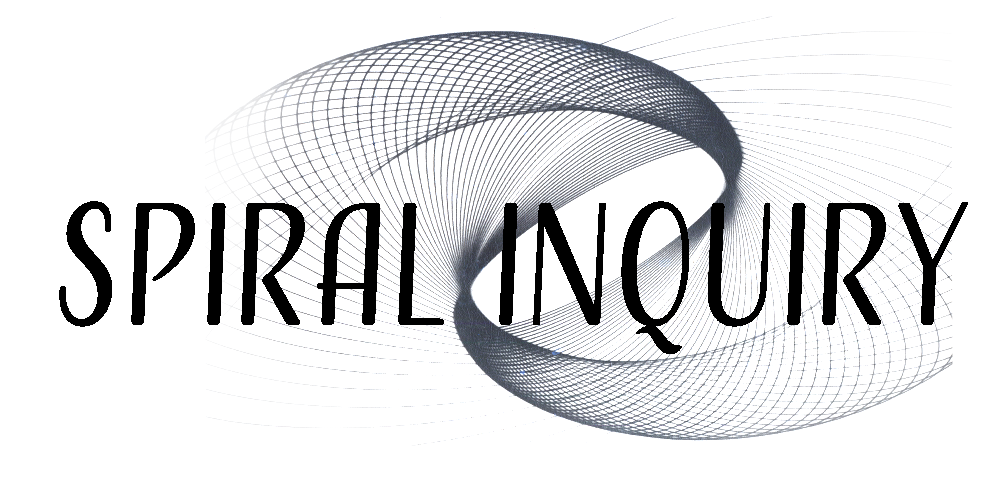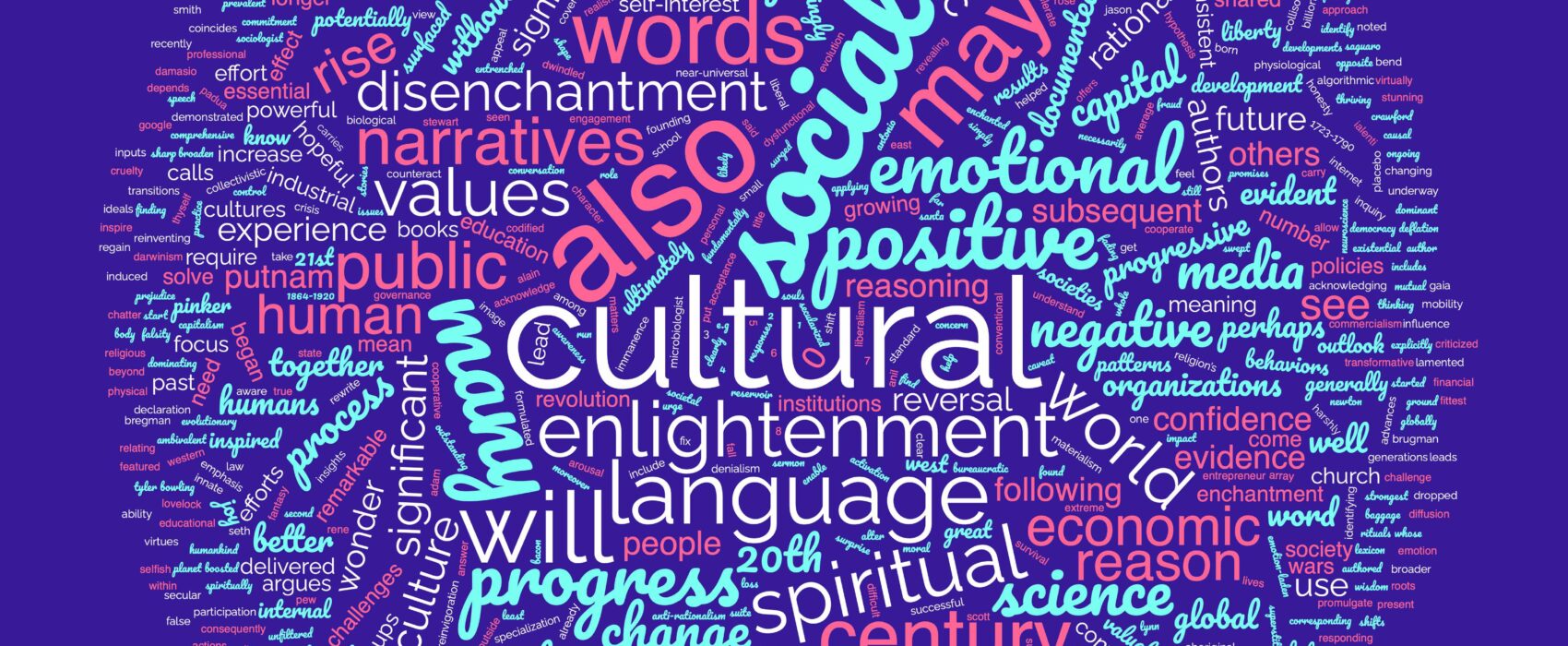The Santa Fe Institute just reported on a groundbreaking analysis of historic language patterns from 1850 to the present. Relying on an algorithmic analysis of word patterns in the millions of books found in the Google Books repository covering the period from 1850 to 2018, the authors (see: The rise and fall of Rationality in Language) identified a striking and consistent trend from 1850 to 1980 towards “reason” and “collective” oriented words. A sharp reversal is then evidenced after 1980 when “feelings” and “individual” oriented words began to rise very significantly. Is this trend a new finding – or is this revealing something we already know? How do we fix it? My answer may surprise you.
Enlightenment Progressivism
It is worth remembering what economic and cultural trends were dominating the world, at least the western world, in the period leading up to and following the halfway mark in the 19th century (e.g., 1850). These include a variety of very significant transitions:
- The Scientific Revolution, spurred by Francis Bacon, Rene Descartes, Isaac Newton and many, many others had swept across Europe: Scientific inquiry delivered outstanding results in improving our understanding of nature and our capacity to bend nature to our will.
- The subsequent Age of Enlightenment revered human reason, applying it to matters of governance and culture, undermining the moral authority of the Church and promoting ideals such as personal liberty, freedom of speech, representative democracy, separation of church and state, equality before the law, universal education, and literacy. Many of these values are explicitly codified into the Declaration of Independence and the US Constitution.
- The industrial revolution and the development of capital enterprise, following the ideas of Adam Smith (1723-1790) and others, put scientific knowledge to work and radically transformed manufacturing, transportation and, ultimately, our lives and work. Notably, the average standard of living for the general population began to increase consistently, a trend that continued through most of the 20th century.
Through the 19th and well into the 20th century, education and literacy, mobility, and economic opportunity, as well as freedom and liberty rose significantly for most people. Consequently, the more advanced liberal democracies in the West were increasingly seen as delivering on enlightenment promises. These progressive developments also led to higher levels of confidence in public institutions and professional expertise, higher levels of public trust, and greater community participation and engagement.
Is it any wonder, then, that people would generally come to value, to respect, and to use, the words and ideas that were consistent with enlightenment progress and the organizations that delivered it? Public discourse followed public sentiment, and progress begat positive associations with reason, science, and collective achievement.
The Great Reversal
The authors of the Rationality in Language study confirm that since 1980, “across languages, the frequency of fact-related words dropped while emotion-laden language surged, a trend paralleled by a shift from collectivistic to individualistic language”.
They acknowledge that identifying causal factors from their analysis is speculative, but they find plausible evidence of explanations for the shifting of language from reason to emotion and from collective to individual perspectives. Among their observations:
- “a connection to tensions arising from neoliberal policies which were defended on rational arguments, while the economic fruits were reaped by an increasingly small fraction of societies…”
- “the trends accelerate around 2007…. <which> also coincides with the global financial crisis.”
- “2007 was also roughly the start of a near-universal global surge of social media…”
- “the spread of misinformation and conspiracy theories may be amplified by social media, as the online diffusion of false news is significantly broader, faster, and deeper than that of true news.”
- “Social media may have boosted societal arousal and sentiment, potentially stimulating an antisystem backlash, including its perceived emphasis on rationality and institutions.”
- “Perhaps a feeling that the world is run in an unfair way started to emerge in the late 1970s when results of neoliberal policies became clear and became amplified with the rise of the internet and especially social media.”
These conclusions may be tentative, but there is considerable evidence about the significant cultural shifts over the past four decades. Twenty-two years ago, Robert Putnam authored a ground-breaking book, Bowling Alone (2000), that documented an ongoing decline in the US of what he called “social capital.” Social capital refers to the bonds that individuals have with their communities and social groups. The strongest of such bonds seem to have been demonstrated in what many called “the greatest generation,” born in the first two decades of the 20th century. This was a generation whose social bonds and cultural attitudes were shaped by the Great Depression and the two World Wars, as well as the dramatic advances in science, technology, liberalism, and economic progress. Putnam and others lamented the decline of social capital that was clearly evident in subsequent generations and called for ways to reverse it. Putnam organized the Saguaro Seminars, the conclusions of which were documented in the book Better Together (2003).
At the same time, public confidence in science had been fading for a variety of reasons, including, perhaps, the rise of complexity and specialization, the challenges of replication and fraud, and the vitriol of the culture wars fomented by some scientists. (See: What is Wrong With Science) The decline in public confidence may also have been part of the general anti-authority trend that surfaced in the 1960’s, a trend which continued in subsequent decades. A recent Pew Research Center’s study in 2015 documented declining levels of trust in the US government from 1960-2015. The general “deflation of expertise” was highlighted recently by Vincent Ialenti in his book Deep Time Reckoning: How Future Thinking Can Help Earth Now (2020). More extreme forms of what can be called anti-rationalism have also been evident in recent years in the form of denialism, conspiracy theories and outright fantasies that promulgate and persist through unfiltered social media channels. (See: A Culture of Fantasy Leading to Cultural Breakdown)
Hope in Renewal
In recent years, many thinkers have echoed Putnam’s concern with the negative outlook that seems prevalent in our society, and they are trying to do something about it.
Stephen Pinker, in Enlightenment Now (2018), argues that the world is continuing to get better at a stunning pace, and that our negative attitudes about progress and change is misguided. He calls for a reinvigoration of enlightenment values as essential for creating a positive future.
Nicholas Christakis, in Blueprint: The Evolutionary Origins of a Good Society (2019), argues that human evolution set the stage for transformational social and economic progress with the development of “the social suite” of positive, empathic and cooperative capacities, contradicting the conventional focus on the dark side of our biological heritage: aggression, cruelty, prejudice, and self-interest.
Philosopher Alain de Botton has taken the approach of founding The School of Life (2019) in the effort to promote a comprehensive educational program with a positive humanistic outlook.
Humankind – A Hopeful History (2019) by Rutger Bregman, documents the evidence that humans are fundamentally good and calls for a new, positive realism, to counteract the “placebo effect” by which negative narratives about humanity lead to more negative behaviors.
A new progressive initiative is also underway to change the dominant negative narrative by reinventing progressivism under the banner of Progress Studies, led by entrepreneur Patrick Collison, economist Tyler Cowen and Jason Crawford (author of the blog The Roots of Progress).
The major caveat to all these efforts is simply this: Trying to rewrite the story without changing the fundamental facts that have led to the story is likely to be unconvincing. As
Saint Anthony of Padua is reported to have said in a sermon c 1200: “Actions speak louder than words.” Moreover, as we have been learning in recent years, confronting denial with data more often leads to a “doubling down” effect. More rational argumentation and factual documentation only seems to lead to greater opposition and denial on many of the polarized issues including climate change.
An Alternative View
In discussing the increase of word use relating to reason from 1850 to 1980, the authors of the Rationality in Language study noted that the rise in the status of science “may have led to a process of “disenchantment” as the role of spiritualism dwindled in modernized, bureaucratic, and secularized societies.” The concept of disenchantment is attributed to the sociologist Max Weber (1864-1920), and it has a peculiarly ambivalent character. On the one hand, Weber is referring to the decline of religious influences and the rejection of superstitions and miracles in favor of rational, scientific concepts. In this meaning, enchantment is a kind of imaginative falsity, and disenchantment is positive.
However, the word enchantment also carries a romantic flavor – the idea of being transported beyond the mundanity of life to a transcendent experience of joy and wonder. In this sense, disenchantment could be referring to the loss of joy and wonder and the increasing sense of alienation and disaffection that the modern, secular, industrialized and commercialized world that we now live in has induced.
I would argue that the reversal of cultural attitudes in the late 21st century reflects in part a growing and agonizing acceptance of this second kind of disenchantment. With the decline of religion and the modern disavowal of religion’s “enchanted” narratives, existential meaning and transcendent value drawn from spiritual experience and teaching have been drained from the human lexicon. Without the emotional, psychological, and spiritual inspiration of those narratives, rituals, and teachings, the values of universal love, compassion, humility, right action, honesty, and self-sacrifice are no longer imbued with divine immanence. They no longer have the same cultural authority they once did. In contrast, the industrial age reveres mechanism and control. Modern science reveres materialism. Darwinism reveres the “survival of the fittest”. Modern capitalism reveres commercialism. Neoliberalism reveres the virtues of self-interest.
Spiritually inspired values carried us into the enlightenment, but without a corresponding spiritual narrative, those values are difficult to sustain.
Towards a Thriving Future
As Christakis, Pinker and Brugman document, there is abundant good will in the human species, and a powerful innate urge to cooperate, to trust, and to solve problems together. This is the reservoir that an amazing number of individuals and groups, including an endless array of charitable, academic, business, social, cultural and community organizations, are seeking to reinvigorate in the effort to engage people in the process of positive cultural change. This is admirable and hopeful, and the signs of a growing cultural awareness and activation are evident.
The biggest challenge to this cultural transformation may be the re-invention of a narrative with a compelling enough emotional and psychological appeal to enable a global consensus. We need a new spiritual baseline. The first image of the Blue Planet, taken by Scott Kelly in 1972, has had a significant cultural impact and was featured on the cover of Stewart Brand’s Whole Earth Catalogue. The Gaia hypothesis, first formulated by chemist James Lovelock and microbiologist Lynn Margulis (1970), has been harshly criticized but has continued to develop a cultural following. Notably, virtually all aboriginal cultures still have spiritual narratives, and those stories are being surfaced, shared, and respected far more than they were in the past. Many religions also contain valuable and relevant spiritual teachings, but also carry cultural baggage from antithetical historical practices and entrenched bureaucracies. All of these narratives are potentially valuable inputs into a new spiritual revival.
There may also be some good news in the recent trends of the increasing use of “emotional” and “individual” words. Ancient cultures from both east and west emphasized that an essential feature of wisdom is to “know thyself.” A focus on one’s inner emotional life does not necessarily mean that one’s behavior is selfish or narcissistic — it may mean the opposite. Modern neuroscience is also acknowledging that human consciousness is an embodied experience. (See this recent conversation between neuroscientists Anil Seth and Antonio Damasio in Nautilus magazine.) The reaction of the body to outside stimuli includes a cascade of physiological signals that humans feel before the reasoning mind is even aware. Those physical, emotional responses influence our reasoning in significant ways, and powerful emotions can derail it completely. A successful therapeutic process, for individuals and for our culture generally, depends on the ability to identify and understand these internal, emotional processes and to alter the destructive, self-defeating, and dysfunctional internal narratives that are often created. Ethan Kross’s remarkable book Chatter (2021) offers some remarkable insights on this process and how to change it. Diane Musho Hamilton and her colleagues are building a community of practice seeking to broaden the capacity for compassionate conversations and to promote our emotional maturity. Healing the divides that have been created, within ourselves and with other humans, will require more communication and many, many more words about “emotions” and “individuals.”
Conclusion
Globally, we are facing a number of serious challenges. My hope is that these pending crises will ultimately inspire “The Better Angels of Our Nature” (to borrow Stephen Pinker’s book title). If the response to crises in the 20th century helped to shape “the greatest generation”, then perhaps our collective efforts responding to the crises in the 21st century will also be positive and progressive. This will require billions of individuals, working on the ground and in their communities and other organizations, to come together under a set of shared values and behaviors that will allow us to regain our mutual respect, commitment, and good will. This will take a lot of words and a lot of conversations. We have sufficient knowledge and reasoning power to solve these crises. We need to be inspired in our souls to do the work. That is what a good transformative narrative is for.





















